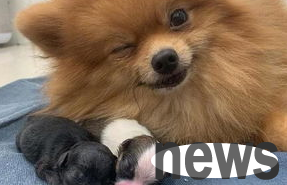Pet dogs are really similar to humans in some places. People have infertility, and dogs have them too. Both male and female dogs may suffer from infertility. Let’s discuss the issue of dog infertility with you.

Infertility of male dogs means that they cannot ejaculate during mating, or that the sperm, dead sperm, sperm deformity in the semen discharged, or that the survival rate is low, and that the egg cannot be fertilized. There are many reasons for this, such as poor feed quality, lack of vitamins (mainly vitamins A and E), insufficient exercise, excessive breeding or long-term failure to breed: male dogs are old and weak, reproductive organ diseases (cryptorchidchilar, testicular atrophy, testicular and epididymiitis, etc.) or infection with certain diseases, such as brucellosis, tuberculosis, endocrine disorders (androgen deficiency, etc.). It mainly shows that the male dog has no sexual desire, and the female dog cannot have an erection in the penis (impossibility), or does not ejaculate after an erection. Check for poor semen quality.
The method of treating infertility of male dogs is to improve feeding management conditions and provide sufficient nutrients to enhance physical fitness. We must strengthen physical exercise and mix with moderate breeding to prevent too much or too little. Diseases in the reproductive tract should be treated appropriately. For male dogs with sexual desire, 10 mg of methyl testosterone (methylgaowanketone) or intramuscular injection of testosterone propionate (testosterone propionate) 20-50 mg/time. For male dogs that are ineffective in treatment or are elderly and weak, they should be eliminated and not used for breeding.
Infertility in female dogs refers to female dogs over 1.5 years old or who can mate normally in estrus in the past, who do not see estrus for a long time (10 to 24 months), or whose estrus is abnormal and has been fertile repeatedly, can be considered infertility. The causes of infertility of the bitch are congenital (such as gender malformation, genital incomplete development, etc.), improper feeding and management (such as simple feed, lack of certain essential amino acids, inorganic salts, vitamins, etc.); the bitch is too fat and thin, old and weak, and is infected with certain diseases (such as brucellosis, tuberculosis, ovarian cysts, endometritis), etc. The main symptoms are that they are not in estrus, or they are in estrus but are repeatedly compatible and even unable to mate.

The method to prevent and treat infertility of female dogs is to try to treat pregnant horse serum, chorionic gonadotropin and estrogen. Dosage: Pregnant horse serum (each refined product contains 400 units, 1000 units, 3000 units) for dogs, 25-200 units per time, subcutaneous or intramuscular injection, once every 1 day or the next day. The dosage of chorionic gonadotropin is 25 to 300 units, and intramuscular injection. Diethylstilbestrol is 0.2~0.5 mg/time. In addition, feeding management conditions should be improved. If the mating and fertilization are still not possible, it should not be used for seeds.
From the above, it can be seen that dogs’ infertility has a lot to do with the food they are fed, so when feeding their own dogs, it is best to master some knowledge about nutritional matching to prevent dogs from being malnourished.
